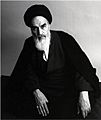Islamism facts for kids
Islamism is a set of ideas that suggest countries with many Muslims should be guided by sharia, which are Islamic laws. It's basically the belief that Islam should influence how a society works, how politics are done, and even how people live their daily lives. Some important thinkers who have inspired these ideas include Yusuf al-Qaradawi, Malcolm X, Ayatollah Khomeini, Sayyid Qutb, and Muhammad Iqbal.
Contents
What is Islamism?
Islamism is a way of thinking that believes Islam should be a big part of how a country is run. This means that laws, government, and public life would follow Islamic teachings. It's not just about personal faith; it's about how faith can shape a whole nation.
Islam and Politics
People who support Islamism believe that Islamic principles offer the best way to create a fair and just society. They often want to see governments make decisions based on Islamic law. This can be different from countries where religion and government are kept separate.
Different Kinds of Islamism
Just like there are many ways to think about politics, there are different types of Islamism. Some groups want to bring about change through peaceful means, like elections. For example, Necmettin Erbakan was an Islamist Prime Minister in Turkey who was elected. Other groups might have more extreme views and use violence to achieve their goals, like the ISIL.
Peaceful Islamism
Many Islamist movements work within existing political systems. They form political parties and take part in elections. Their goal is to influence laws and policies to be more in line with Islamic values, but they do this through peaceful and democratic ways.
Extreme Islamism
Some groups, however, have very strict and extreme interpretations of Islamism. They might believe that violence is necessary to create an Islamic state. These groups are often called extremist and are widely condemned for their actions. An example is the ISIL, which tried to create its own territory by force.
Key Thinkers and Leaders
Many different people have shaped the ideas of Islamism over time. These thinkers often wrote books or gave speeches about how Islam could guide modern societies.
Early Influences
Thinkers like Jamal al-Din al-Afghani helped to inspire early ideas about how Muslim countries could become strong again. They believed that by returning to Islamic principles, Muslim societies could overcome challenges.
Modern Leaders
In more recent times, leaders like Ayatollah Khomeini in Iran led a major change called the Islamic Revolution. This event transformed Iran into an Islamic republic. Other figures like Sayyid Qutb also wrote important works that influenced many Islamist movements.
Islamism Around the World
Islamist ideas have appeared in many different countries. Sometimes, they lead to political parties gaining power. Other times, they lead to protests or even conflicts.
In the Middle East
In countries like Egypt and Iran, Islamist movements have played a big role in politics. The Muslim Brotherhood in Egypt is one of the oldest and most well-known Islamist groups. In Iran, the Islamic Revolution brought about a new form of government based on Islamic law.
Beyond the Middle East
Islamist ideas are not just found in the Middle East. They have influenced movements in places like Pakistan, Afghanistan, and even among Muslim communities in Western countries. For example, some protests, like those in Sydney, have been organized by people with Islamist views.
Images for kids
-
Islamic State of Iraq and the Levant (ISIL) in Raqqa, Syria, 2014
-
Necmettin Erbakan, elected in 1996, was the second Islamist Prime Minister of Turkey after Şemsettin Günaltay, but was removed from power by a "postmodern coup d'état" in 1997.
-
ISIL's territory, in grey, at the time of its greatest territorial extent in May 2015
-
Afghan mujahideen representatives with President Ronald Reagan at the White House in 1983.
-
Sayyid Muhsin al-Hakim (Arabic: سيد محسن الطباطبائي الحكيم; 31 May 1889 – 2 June 1970) was a student of Akhund Khurasani.
-
Sayyid Qutb (Arabic: سيد إبراهيم حسين قطب; 1906 – 1966) was an Egyptian Sunni islamist author and a leading member of the Egyptian Muslim Brotherhood in the 1950s and 1960s.
-
Ayatullah Sayyid Mohammad Hadi al-Milani (Persian: سيد محمد هادى حسينى ميلانی; July 1, 1895 – August 7, 1975) was a student of Ayatullah Na'ini.
-
Ali Shariati (Persian: علی شریعتی مزینانی; 1933 – 1977).
-
Ruhollah Khomeini(Persian: سید روح الله خمینی), anti-secularist leader of Islamic Revolution of Iran was a student of a mystic Sheikh, Muhammad Ali Shah-Abadi.
-
Murtaza Mutahhari (Persian: مرتضی مطهری; 31 January 1919 – 1 May 1979) was a moderate islamist. He believed that a jurist only had a supervisory role and was not supposed to govern.
-
Ruhollah Khomeini in Tehran with Ahmad Khomeini and Mohammad-Ali Rajai.
See also
 In Spanish: Islamismo para niños
In Spanish: Islamismo para niños
 | Kyle Baker |
 | Joseph Yoakum |
 | Laura Wheeler Waring |
 | Henry Ossawa Tanner |


















